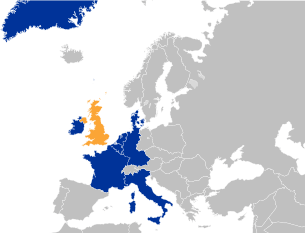EU three
The EU three, also known as EU big three, EU triumvirate, EU trio or simply E3, refers to France, Germany and Italy, a group that consists of the three large founding members of the European Union.[1][2][3]
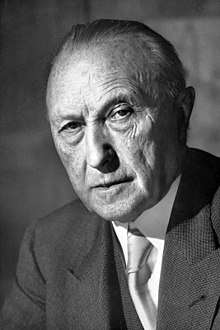
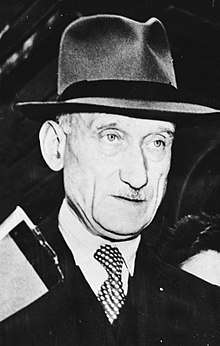
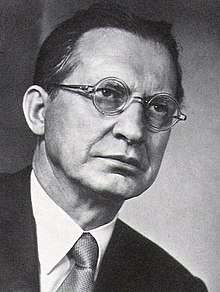
It has also been used to refer to the grouping of France, Germany, and the United Kingdom, especially during the negotiations with Iran from 2003.[4][5][6]
Activities
Germany, France and Italy were part of the original Inner Six founders of the EU along with Benelux nations. The UK joined the European communities in 1973 and decided to leave in 2016.
Negotiations with Iran
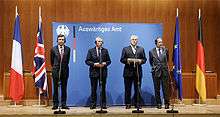
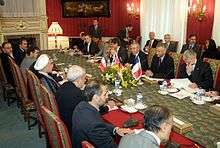
In 2003, France, Germany and the UK launched negotiations attempting to limit the Iranian nuclear program, which led to the Tehran Declaration of 21 October 2003 and the voluntary Paris Agreement of 15 November 2004.[7][8][9]
EU 3 + 3, more commonly referred to as the E3+3,[10] refers to a grouping which includes the EU-3 and China, Russia, and the United States. It was coined when these states joined the EU diplomatic efforts with Iran in 2006. In the United States and Russia, it is more commonly known as P5+1, which refers to the five permanent members of the UN Security Council plus Germany.[11]
Italy took part in a number of these meetings between 2006 and 2007.[12][13] In 2014, under the request of the Italian PM Matteo Renzi, Foreign Minister Federica Mogherini was named High Representative of the EU as the negotiations approached a conclusion and came to an end with the elaboration of the Joint Comprehensive Plan of Action in 2015.[14]
Other negotiations
Determined to keep the European project intact in the wake of the UK's vote to leave the European Union in 2016, France, Germany and Italy called for greater integration in various trilateral summits in Berlin, Paris and Ventotene.[15][16][17] More recently France, Germany and Italy have agreed a common position about the Paris climate agreement [18] they have led a draft EU law to restrain Chinese acquisitions of European firms and technologies[19] and they lead the EU sanctions on North Korea.[20]
Statistics
| EU Big Three | ||||||||||
|---|---|---|---|---|---|---|---|---|---|---|
| Country | Population | Votes in the Council (pre-Brexit) | Contribution to EU budget in euro | MEPs | NATO Quint | G7/G8/G20 | P5 | G4 nations | Uniting for Consensus | |
| 66,616,416 | 13.05% | 17,303,107,859 | 16.44% | 74 | ||||||
| 80,716,000 | 16.06% | 22,218,438,941 | 21.11% | 96 | ||||||
| 60,782,668 | 12.00% | 14,359,479,157 | 13.64% | 73 | ||||||
See also
| Part of a series of articles on | ||||||||||
| British membership of the European Union | ||||||||||
|---|---|---|---|---|---|---|---|---|---|---|
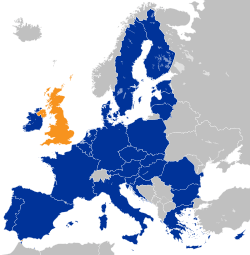 | ||||||||||
|
Treaty amendments
|
||||||||||
|
|
||||||||||
|
Officials and bodies |
||||||||||
|
| ||||||||||
References
- "EU divided on answer to Brexit 'wake up call'". Retrieved 17 June 2017.
- "Meet the (divided) committee to save Europe". 27 June 2016. Retrieved 17 June 2017.
- "Brexit: Germany, France, Italy vow no talks before Britain makes formal decision on EU - Brexit: UK EU Referendum - ABC News (Australian Broadcasting Corporation)". mobile.abc.net.au. Retrieved 17 June 2017.
- Bretherton, Charlotte; John Vogler (2006). The European Union as a Global Actor. Routledge. p. 174. ISBN 9780415282451.
- Jovanovic, Miroslav (11 September 2002). "European Economic Integration: Limits and Prospects". Routledge. Retrieved 17 June 2017 – via Google Books.
- Capet, A. (10 October 2006). "Britain, France and the Entente Cordiale Since 1904". Springer. Retrieved 17 June 2017 – via Google Books.
- Peter Crail, Maria Lorenzo Sobrado (1 December 2004). "IAEA Board Welcomes EU-Iran Agreement: Is Iran Providing Assurances or Merely Providing Amusement?". NTI. Retrieved 3 April 2015.
- Kjell Engelbrekt, Jan Hallenberg (2010). European Union and Strategy: An Emerging Actor. Routledge. pp. 94–97. ISBN 9781134106790. Retrieved 3 April 2015.
- Joachim Koops, Gjovalin Macaj (2014). The European Union as a Diplomatic Actor. Palgrave Macmillan. ISBN 9781137356864. Retrieved 3 April 2015.
- "Nuclear talks between Iran and E3+3 to continue in November". Foreign & Commonwealth Office. 16 October 2013. Retrieved 8 November 2013.
- "You say P5+1, I say E3+3". Retrieved 17 June 2017.
- "Perché l'Italia non partecipa ai negoziati con l'Iran?". Linkiesta. October 16, 2013.
- "...such meetings took place in Berlin and New York..."
- Greco, Ettore; Ronzitti, Natalino (September 30, 2016). "Rapporto sulla politica estera italiana: il governo Renzi: Edizione 2016". Edizioni Nuova Cultura – via Google Books.
- "Merkel besucht Renzi Wie das Europa-Tandem zum Trike wurde". FAZ.NET. Retrieved 17 June 2017.
- "Europe Is Already Plotting A Future Without Britain". Retrieved 17 June 2017.
- "Italy joins Europe's big league, but is it primed to fail?". 1 September 2016. Retrieved 17 June 2017.
- "Germany, France, Italy: Paris Agreement 'cannot be renegotiated'". Evening Standard. June 1, 2017.
- "EU drafting law to restrain Chinese takeovers | DW | 28.01.2018". DW.COM.
- says, Johan Stavers (September 4, 2017). "Germany, France, Italy seek tougher EU sanctions on North Korea".
External links
- EU calls for UN action over Iran, BBC News, 12 January 2006
- Kaveh L Afrasiabi (1 April 2006). "Iran: Options for a face-saving solution". Asia Times. Retrieved 2009-06-17.
